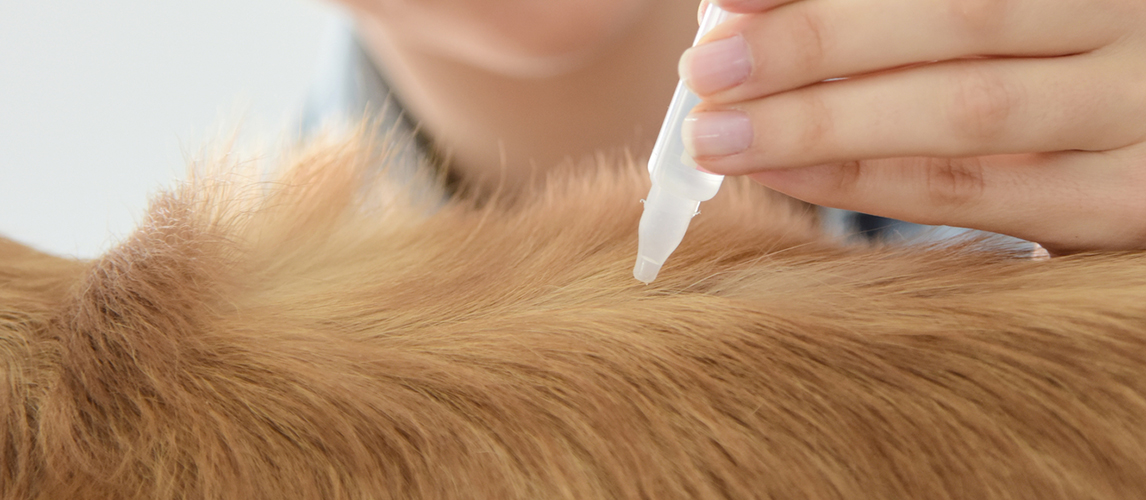Intestinal parasitism is a major health problem among dogs especially those who spend some time outdoors or those who get in contact with objects that are contaminated with these parasites. Allowing these intestinal worms to grow can adversely affect the health of your pooch, leading to malnutrition and a host of other problems. This is why it is crucial that we get rid of these intestinal worms through the use of dewormers. Unfortunately, the market is littered with products that do not really kill these pests or that they are effective in doing so yet come with a host of serious side effects. What you need is the best dog dewormer that is proven to be both effective and safe for your pooch. Here are 6 of the best in the market today.
The 6 Top-Rated Dewormers for Dogs
1 Safe-Guard Canine Dewormer for Dogs
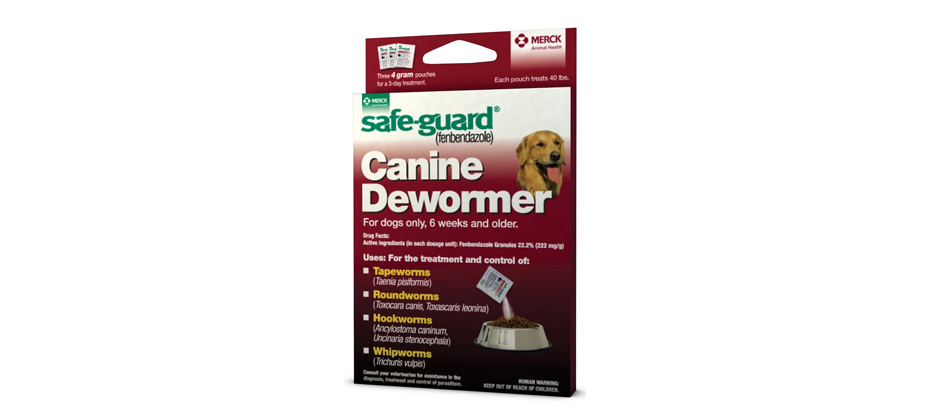
- Kills 2 species each of hookworms and roundworms and 1 specie each of tapeworm and whipworm
- Can be given to puppies at least 6 weeks old
- Active ingredient is fenbendazole
- Comes in easy-to-mix granule formulation
Fenbendazole is the active ingredient of 8-in-1 Pet’s Safe-Guard Canine Dewormer. This is one of the safest and most effective anthelminthics according to veterinarians. Regrettably, it doesn’t kill one of the most common tapeworms known to infect dogs – Dipylidium caninum. You will find its granule formulation to be exceptionally useful since this makes it a lot easier to mix with your young puppy’s food.
The good thing with Safe-Guard is that it can be administered to pups as young as 6 weeks old (although we’ve seen products that can be given much earlier) and pregnant dogs as well as pooches that are currently infected with heartworms. Giving Safe-Guard now will confer protection for your pooch for about 6 months.
Read here our detailed Safe-Guard Dewormer Review.

2 Elanco Tapeworm Dewormer for Dogs
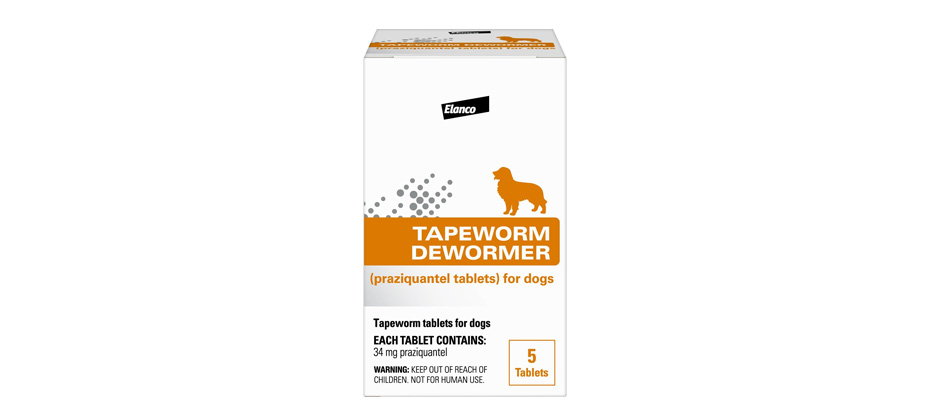
- Kills common tapeworms in dogs
- Can be given to puppies as young as 4 weeks old
- Tablet can be crumbled for easier administration with food
- Praziquantel as active ingredient
If you’re not really concerned about whipworm, roundworm, or hookworm infestation in your pooch, but are generally concerned about Dipylidium caninum and Echinococcus granulosus infections as well as other tapeworm infections, then you’ll find confidence in Elanco’s Tapeworm Dewormer. You can look at it as something that is very specific for dog tapeworm infestations and can be easily given to a 4-week old puppy. It comes as a crushable tablet so you have two choices when it comes to its administration. You can easily give it as is per mouth or ground it to bits for mixing with your pet’s food.
Either way you can trust on the reputation of Elanco Animal Health to provide your pooch with amazing tapeworm removal results.

3 Sentry Worm X Plus 7 Way De-Wormer
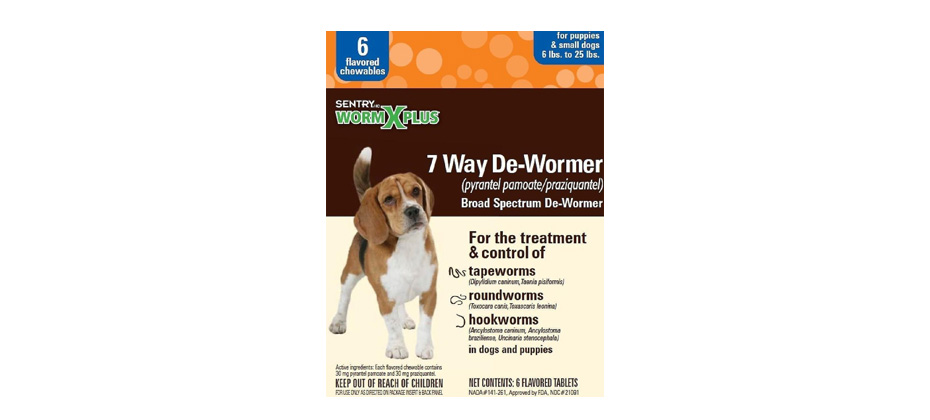
- Kills 2 species each of tapeworms and roundworms and 3 species of hookworms
- Can be given to puppies weighing at least 6 pounds
- Contains pyrantel and praziquantel as active ingredients
- Comes in flavored chewable tablets
HC WormX Plus is a dog dewormer that contains two of the most trusted anthelminthics in veterinary medicine. While the WormX Plus doesn’t really give age recommendations, it does provide a minimum weight recommendation of 6 pounds to help get rid of 7 different species of worms except whipworms. It also comes in flavorful chewable tablet formulation making it super easy to administer.
However, if your dog’s main issue is whipworm infestation such as T vulpis, then you might want to get another brand. Also, the effectiveness of WormX Plus is only good for a month, unlike that of fenbendazole-containing products that can last up to 6 months.

4 Pfizer Dog Dewormer
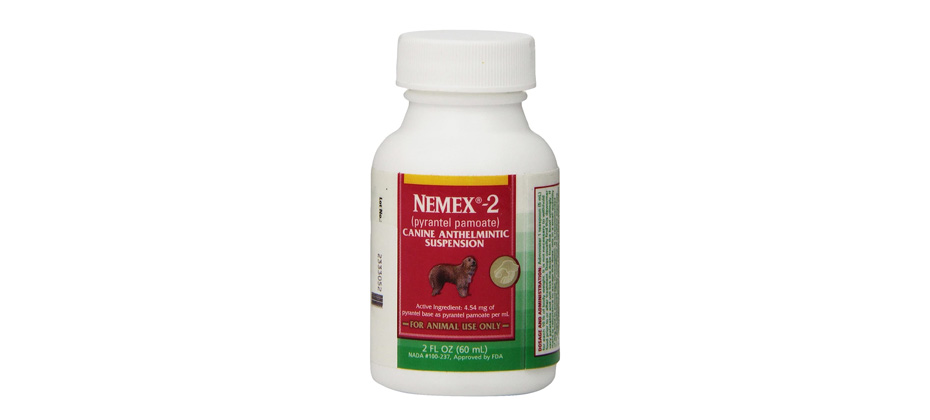
- Kills 2 species each of roundworms and hookworms
- Comes in liquid suspension formulation
- Can be administered to dogs as young as 2 weeks old
- Pyrantel pamoate as sole active ingredient
This single-ingredient dewormer from Pfizer is effective in the killing of 2 species each of roundworms and hookworms and as such will not have any effect on tapeworms and whipworms. Nemex 2 contains pyrantel pamoate and can be easily administered to puppies as young as 2 weeks old because of its liquid suspension formulation. The same formulation is guaranteed to be palatable so dogs will not have any issues licking it straight from the cup or bowl. However, in instances where the pooch simply isn’t cooperating, Nemex 2 can be mixed with a small amount of dog food to help in the administration.

5 Durvet Dewormers For Dogs
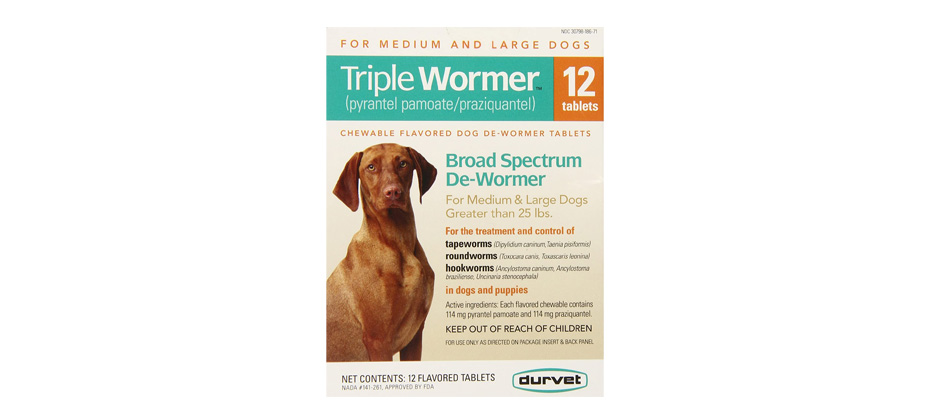
- Kills 2 species each of tapeworms and roundworms and 3 species of hookworms
- Formulated in easy-to-administer chewable tablet
- Contains the broad spectrum anthelminthics pyrantel and praziquantel
Durvet’s Triple Wormer Broad Spectrum Dewormer can be viewed as having the same characteristics and formulation as the HC WormX Plus which kills the same species of tapeworms, hookworms, and roundworms in a chewable tablet formulation. The main difference is that Durvet’s Triple Wormer costs significantly less than the HC WormX Plus on a per-tablet basis.
It also has a minimum weight recommendation of 6 pounds using its 30 mg pack. As always, if your pooch’s main concern is whipworm infestation, then you clearly wouldn’t be treating your dog’s infection with the Triple Wormer; you’ll need something else. Initial deworming with the Triple Wormer requires administration of 2 doses spaced 2 weeks apart for maximum effectiveness.

6 Elanco Quad Dewormer
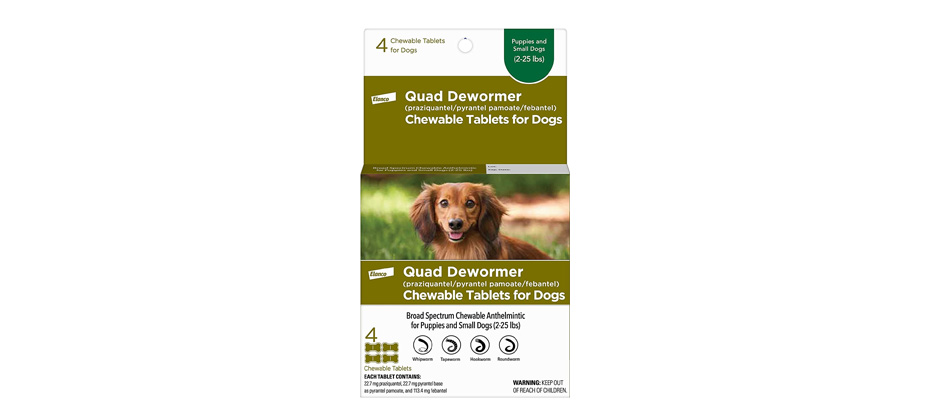
- Kills 2 species of tapeworms, 2 roundworms, 2 hookworms, and a specie of whipworm
- Combination of broad spectrum anthelminthics including praziquantel, pyrantel, and febantel
- Available in dog-friendly chewable tablet presentation
- Can be used on puppies weighing at least 2 pounds
There are a few things you’ll love about the Elanco Quad Dewormer. First, it’s one of the first anthelminthics to contain 3 active ingredients in one formulation to give is exceptional broad spectrum of anti-intestinal parasitic activity. Second, it kills 7 species of intestinal worms including D caninum that is typically not addressed by fenbendazole-containing anthelminthics. Third, it comes in flavored chewable tablets allowing for easy administration. Fourth, it can be given to pooches that weigh at least 2 pounds. The blend of ingredients has been shown to produce the passing of worms in as short as 8 hours.

Best Dewormer for Dogs: Buying Guide
The market is literally flooded with a lot of dog dewormers that promise instant results within a few days. Some actually work but with considerable side effects. While there are products that are labeled as Over-the-Counter dewormers, we strongly advise you against buying these without first checking with your veterinarian since different dogs will react differently to the same ingredient. Safety is a very important consideration whenever buying ‘medications’ for your pooch as you don’t want to add insult to your dog’s predicament.
What Are the Symptoms of Worms in Dogs?
There are 4 very common intestinal worms that infest the gut of dogs as well as other pets. These include tapeworms, roundworms, hookworms, and whipworms, with the first 2 types of intestinal parasites being large enough to be readily seen in the stool of dogs. Unless you bring your pooch to the veterinarian for a routine clinical evaluation with stool examination, it is often quite difficult to tell if your pooch has worms, especially in the early stages of the infestation.
The main issue with intestinal parasites is that they compete with normal cells in the absorption of nutrients found in the food of your dog. Instead of these nutrients being absorbed and delivered to the cells of the dog’s body, these nutrients are consumed by the parasites themselves. This is the reason why they are called parasites in the first place since they feed off their hosts.
The symptoms of intestinal parasitism in dogs are closely attributed to two fundamental problems: malnutrition and worm volume growth. These can be manifested as follows.
- Your dog has increased appetite yet it is not gaining weight or it is always hungry but it is losing weight because the nutrients in its food are being taken up by the worms.
- Weakness or low energy because of the substantial reduction in nutrient absorption.
- Dull coat or even hair loss secondary to inadequate nutrients.
- Intense itching or skin irritation because of migration of worm larvae.
- Scratching of your dog’s behind or rubbing it against a furniture or even on the ground in an effort to physically ‘remove’ worms that may have already migrated to the anus.
- Pot-bellied appearance or bloating because of the growing mass of worms as well as the gas that each worm gives off.
- Vomiting and diarrhea in an effort to get rid of the bolus of worms from the intestines. In many cases blood can accompany the diarrhea as well as visible worms. Worms can be visible in the vomitus, too.
- Visible worms or even eggs in the dog’s stool or vomitus. This just confirms your suspicion that your pooch has worms.
You may also like our article on the Best Grain Free Dog Food.
How Do Dogs Get Worms?

There is no single mechanism upon which dogs can get intestinal worms. However, given the fact that these parasites are mostly confined to the gastrointestinal tract, then their mode of transmission will definitely involve passage through the dog’s mouth and the rest of its digestive tract. Here’s a look at how dogs get these common worms.
Hookworms
There are two methods upon which dogs can get hookworms. The first is through direct ingestion of the eggs that are typically found in the stool of an infected dog. The second is more spectacular in the sense that it underscores the uniqueness of these intestinal parasites. When eggs are passed in the stool, they hatch larvae within 5 days. If they are not ingested by another dog, these larvae crawl on the surrounding soil. If a dog walks on this soil, the larvae can penetrate the dog’s skin in between its paw pads. Once it is through the dermis, it enters the bloodstream, reaches the lungs, crawls up the trachea, and then swallowed towards the colon. Technically, regardless of the route, they will always end up in the colon, although the second mode of transmission can produce other symptoms as the hookworm larvae are migrating.
Roundworms
These intestinal parasites are very cunning, to say the least. Dogs get infected when they ingest anything that has been contaminated with dog feces containing roundworm eggs. The eggs hatch in the dog’s gut, releasing larvae which penetrate the wall of the intestines. From there, the larvae invade the bloodstream and reach the alveoli of the lungs where the little critter crawls up the airway only to be coughed up and swallowed back to the gut. If the dog is pregnant at the time of larval migration, larvae can travel to the placenta and infect unborn puppies. If the dog is nursing, the larvae can also be found in their milk. Dogs can also get roundworms by ingesting intermediate hosts that feed on encysted eggs.
Tapeworms
Tapeworms have a very unique way of getting transmitted to dogs: they need an intermediate host. The mode of transmission is generally the same as in any other worm. It starts with the passing of embryonated eggs in the feces which can be ingested by intermediate hosts such as sheep, pig, cattle, and many more. In the intestines of these intermediate hosts the eggs hatch, releasing larvae and penetrating the liver, lungs, and other organs. When these organ meats are given to dogs without proper preparation and cooking, the larvae are transmitted to dogs and mature into adults, ready to start the cycle anew.
Whipworms
The adult whipworm lays eggs inside the large intestines of an infected dog. When these eggs are pushed towards the anus and are evacuated together with the stool of the dog, they get embryonated in the environment within 2 to 4 weeks. During this period, an infective larva is already developing. If a dog licks the soil that has been contaminated with dog feces containing the whipworm eggs, the eggs are passed down to the new dog’s colon where the larvae are released into the intestinal epithelium. From there it grows to become an adult whipworm.
How Can I Deworm My Dog?

While there are plenty of dog dewormers that claim they don’t need a prescription for its use, you should know better. While these products may have been proven safe and effective, you can still not be pretty sure when it comes to your dog. That is why it is very important that you bring your pet to your veterinarian first so he can make a very thorough evaluation on what dog dewormer will be most appropriate for your pooch.
When it comes to deworming schedules, the Centers for Disease Control and Prevention together with the American Association of Veterinary Parasitologists have forwarded the following guidelines.
- All puppies should be dewormed at the age of 2, 4, 6, and 8 weeks then followed by another dose by the age of 12 and 16 weeks. Puppies should be dewormed again at age 6 months and at age 12 months.
- All adult dogs should be dewormed twice a year for the rest of its life.
- All new dogs of the household regardless of age and history should be dewormed immediately upon arrival in the house. This should be repeated after 2 weeks before observing the usual deworming schedule for adult dogs.
There are also a few things you have to keep in mind when deworming your dog.
- Majority of OTC preparations are not effective against tapeworms. As such, it is imperative to check with your vet on the best possible anti-tapeworm medication.
- Roundworms are also very difficult to eradicate completely because many become dormant for many years. Also, there are those that reactivate only when the dog is near-term or during lactation.
Dogs explore most of their world through their mouths. Unfortunately, this also exposes them to the risks of ingesting eggs that can turn into intestinal worms. While these dog dewormers have been proven safe and effective, knowing how to properly deworm your dog by adhering to a strict deworming schedule is crucial.
Sources:
- Deworming in Dogs, Wag Walking
- Deworming Dogs: How to Diagnose Intestinal Parasites And Choose a Dewormer, Banfield Pet Hospital




